Bermuda Grass Pictures
Bermuda grass pictures can be helpful for selecting a common lawn grass or eliminating a troublesome weed.
Many people find a weed invading their lawn or garden areas and want to verify its identity before they try to get rid of it. Other people are looking for a particular variety of lawn grass that is suitable to their location. The difference in these two needs requires a slightly different approach to photos.
Do you need to see photos of bermuda grass? What does it look like compared to crabgrass?
The primary focus of this material will be identifying unwanted bermuda grass, for purposes of getting rid of it. This is the most common request I get from gardeners or homeowners regarding this two-faced plant. Let's look at the various features which can confirm your diagnosis.
FTC Disclosure:
If you make a purchase via a link on this site, I may receive a small commission on the transaction - at no added cost to you.Bermuda Grass: Pictures of Runners or Stolons
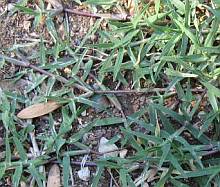
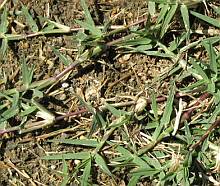
The runners of bermuda grass are the most typical feature that people recognize. It is also the most common reason why they don’t like it. Common bermuda can be very invasive. It puts down roots from the nodes or joints as it spreads, which is why it is difficult to pull up.
This same tendency however is an advantage for areas where the lawn is prone to develop bare spots from kids, pets or certain activities. Bermuda grass is one of the few grass types that can self-repair a lawn.
Bermuda Grass: Pictures of Rhizomes (Underground Runners)
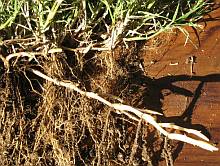
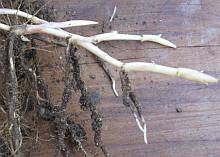
These are not roots. Rhizomes serve 2 purposes, reproduction and survival.
They spread out from the base of a mature plant and find a new area to grow. They may spread just a few inches before surfacing to start a new plant. They can also travel dozens of feet, under plastic sheeting or driveways before they find an opening to get above ground.
Rhizomes can also be the plant’s survival mode. If the top growth dies off for any reason, the underground shoot often survives and can remain viable for years. When conditions are right, it pushes out new growth to the surface to start a new plant. A small portion of a shoot left in the ground can be enough to regenerate.
Bermuda Grass: Pictures Compared to Crabgrass
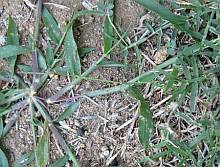
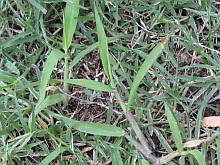
Bermuda grass is often confused with crabgrass, or the names may be used interchangeably. These bermuda grass pictures show how the crab grass has a wider leaf structure than the bermuda.
The bermuda grass pictured will become dense by establishing many small plants as the runners go out. The crabgrass will be a dense single plant that sprawls. See more pictures and information at these two pages: Crabgrass Pictures and How To Identify Crabgrass.
Bermuda Grass: Pictures of Seed Stalks
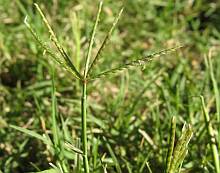
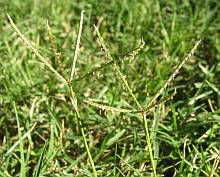
Bermuda grass puts up seed stalks throughout the growing season. These are worrisome to folks who wish to avoid an invasion in other areas. Though the seed pictures here are indicative of bermuda grass, they are not unique. Crabgrass has a similar seed appearance, usually larger, but it fluctuates depending on growing conditions.
Bermuda Grass: Pictures of Low Growing and Taller Grass
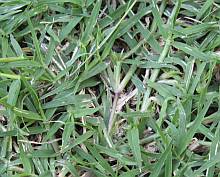
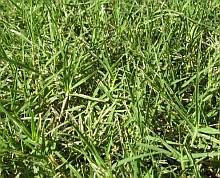
Bermuda grass is more versatile than many grasses. In accommodates a wide range of mowing heights and adapts its growth pattern accordingly.
If mowed less than 1”, it spreads rapidly, remains prostrate, gets very dense with little spacing between the leaf blades and will tend to have a more consistent color.
If mowed higher, the leaf blades are more spread out, the turf is not so dense. The tops of the grass will sometimes be darker green than the lower portion which is shaded. This can make the over-all coloring appear sporadic or less intense.
Bermuda Grass: Pictures Of Common Bermuda Mixed With Other Lawn Grass Types
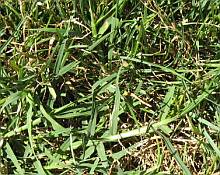
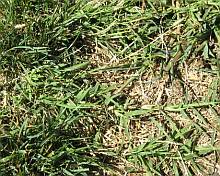
Common bermuda grass often infiltrates lawns of other grass species. This can be bad, good or indifferent for different situations. Lawns that have heavy traffic or kids or dogs present can benefit from the ability of bermuda grass to spread and fill in.
If it becomes dominant, the bermuda presents a problem when it goes dormant in cold weather and the appearance of the lawn suffers.
Want To See More Common Bermuda Grass
Pictures and Information?
Anyone who investigates this topic with the intention of getting rid of bermuda grass from their lawn or garden will benefit from the recent addition of these two documents to the Garden Counselor site.
Go to Bermuda Grass: Identify and Compare.
This detailed article gives in-depth information on the appearance and growing habits of common bermuda grass.
Go to How To Kill Bermuda Grass Here we offer a lengthy article on what you need to do to completely remove weed bermuda from a yard area before planting a new lawn. This is part of series that will cover other topics as well, such as how to control or suppress bermuda in an existing lawn, and in other yard situations.
Bermuda Grass: Pictures Of Hybrid Varieties For Lawns
Are you considering bermuda grass as your lawn grass of choice? Common bermuda will work but some of the negative characteristics can be avoided with a bermuda hybrid. Many hybrid varieties of bermuda grass have been developed. Each has characteristics that make it best suited for slightly different growing conditions or applications.
In most cases the hybrid varieties do not put out seed stalks and they are slower to put out runners. This makes them less invasive and an excellent choice for many lawn areas. They tend to look best when mowed short with a reel type lawnmower, rather than the typical rotary mower.
These can only be established from sod, plugs or stolons.
I am in the process of compiling photos of typical lawn varieties. Until those are prepared, you can check out Seedland.com as a source of good photos of hybrid bermuda photos. I haven’t had any dealings with them for ordering product, but you may find their pictures and descriptions helpful if you are considering a bermuda lawn.
Hopefully these bermuda grass pictures and descriptions have provided the information you need to make an accurate identification. Do you have any remaining questions or lingering doubts about your garden project or problem?
Please don't hesitate to contact the Garden Counselor for a free, personalized review of your situation. We’ll be glad to help and clarify your options on any lawn or garden question.
Thanks for visiting. I hope you'll share the site with your friends and neighbors. (Except the guy who is always bragging about his trophy landscape?) We’d love to help any way we can.
SPONSORED LINKS
Go to How To Kill Bermuda Grass.
Go to How To Get Rid Of Lawn Weeds
Go to Home Page for all Lawn Care Topics
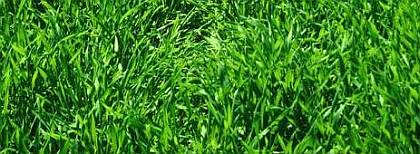
BRING ON SPRING!
A Stronger, Greener Lawn
Starts Now...
with help from DoMyOwn
Products * Videos * Schedules * Guides




